Mike Dusek and Daniel Campbell, two unhoused people living in Portland, walked toward the Burnside Bridge underpass, each carrying an arm full of zip-close bags stuffed with supplies to give to other unhoused people.
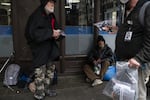
Mike Dusek, an unhoused person living in Portland, distributes hygiene supplies to other members of the unhoused community on March 28, 2020 in Portland, Oregon.
Jonathan Levinson / OPB
“What we’re doing is handing out socks, hats, hand sanitizers, information on the coronavirus,” Dusek said. “Just keeping people informed on what’s going on and trying to keep people safe.”
As Portland residents have sheltered in place, there have been fewer extra resources available for the city’s unhoused community. Less foot traffic means less spare change. Closed restaurants mean no extra food donated to soup kitchens.
“Having all these people hiding out being so scared of this...it does hinder our community,” Dusek said.
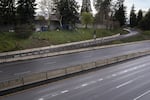
A camp of unhoused people is seen along an empty stretch of I-5 in North Portland. As Portland residents have sheltered in place, there have been fewer extra resources available for the city’s unhoused community.
Jonathan Levinson / OPB
But the crisis is also bringing the unhoused community together. People are moving their tents closer and sharing resources.
“I see a lot more homeless people working together,” Dusek said. “You got the heroin addicts, the gang members and the punk rockers are all hanging out together. You wouldn’t have ever seen that.”
They’re even finding opportunity and empowerment they may otherwise not have.
The supply distribution Dusek and Campbell were doing is being run out of the Street Roots headquarters. Street Roots is a newspaper in Portland that covers social justice issues. Dusek and Campbell are among 280 unhoused people who sell the newspaper to make money.
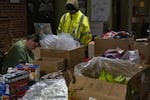
Chris Drake (left) packs bags of supplies to be distributed to Portland’s unhoused community on March 25, 2020 in Portland, Oregon. Street Roots’ is coordinating an outreach program distributing hygiene supplies and coronavirus information to Portland’s unhoused community.
Jonathan Levinson / OPB
But as the coronavirus forced businesses to close, Street Roots went all-digital, ending street sales and depriving nearly 300 people of their income.
“But we don't want to cut people off from income,” said Kaia Sand, Street Roots’ executive director. “That would be just adding so much grief and stress and desperation to an already desperate situation. So we're totally redefining ourselves in this moment.”
In addition to publishing a newspaper, one of Street Roots' core missions is creating income opportunities for people who are unhoused. One of the ways they're still doing that is by paying people to pack and distribute those zip-seal bags full of supplies.
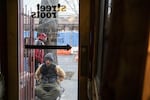
An unhoused person waits for Street Roots to open on March 25, 2020 in Portland, Oregon. The organization is coordinating an outreach program distributing hygiene supplies and coronavirus information to Portland’s unhoused community.
Jonathan Levinson / OPB
During the pandemic, Street Roots has buzzed with activity as former newspaper vendors are running the show.
The program is the brainchild of Raven Drake, an unhoused transgender woman who used to be a Navy Corpsman. In the earliest days of the coronavirus outbreak, she set up a makeshift medical tent at her camp along I-5 in North Portland.
“It started as an initiative to keep my campmates safe,” she said. “Once the first COVID case hit, Kaia came to me and she asked us to build an outreach program out of Street Roots.”
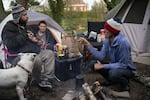
Mike Dusek, Chris Drake, and Raven Drake at their camp on I-5 in North Portland. Drake, a former Navy Corpsman, set up a makeshift medical tent at her camp to help take care of her camp mates and anyone else who might need medical help during the coronavirus pandemic.
Jonathan Levinson / OPB
As of this week, they will have been up and running for a month. Drake said in the past two weeks they’ve done outreach to more than 2,282 people. In addition to coordinating the outreach initiative, she’s also joining daily meetings with Portland and Multnomah County leaders to help tailor their response to the coronavirus in the unhoused community.
On Tuesday, the Multnomah County public health department confirmed the first two cases of COVID-19 among the city's unhoused population.
The unhoused community has a higher rate of underlying medical conditions, making them particularly vulnerable to the coronavirus. Combined with difficulty maintaining physical distance, fears that the virus would wreak havoc among the unhoused have prompted city and county officials to convert the Oregon Convention Center and two community centers into makeshift shelters. The Jupiter Hotel is also being used to house people showing symptoms.
It’s not uncommon for people with lived experience to find work in government or with advocacy groups helping shape policy. But the initiative at Street Roots and Drake’s level of involvement stands out since most of the people involved are all currently unhoused.
“Folks are usually surviving,” said Denis Theriault, spokesperson for Multnomah County Joint Office of Homeless Services. “For someone currently camping to be part of the planning work, that’s a little unusual.”
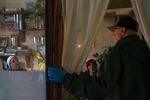
Kaia Sand and Raven Drake speak with a Street Roots volunteer on March 25, 2020 in Portland, Oregon. Drake, a former Navy Corpsman, has helped start an outreach program distributing hygiene supplies and coronavirus information to Portland’s unhoused community.
Jonathan Levinson / OPB
Unusual but invaluable. And maybe enduring.
“This is something we can look to going forward in terms of lines of communication working with partners we haven’t worked with before,” Theriault said. “Those relationships are going to be gold later.”
Street Roots’ Sand said the unhoused community is already more resourceful than most, and in many ways, they’re uniquely capable of thriving in this environment.
“When we're in a crisis like this, we actually need their knowledge,” Sand said. “And sometimes we need to just step back and listen to what they have to say about how we possibly can go forward.”
With so many vendors taking on new roles and responsibilities, Sand said she’s seeing many of them flourish.
On a cold, wet morning, two days into Portland’s stay home, stay safe order, Rainbow was in front of Street Roots with her arms stretched wide to demonstrate safe social distance. On the sidewalk in front of her, spaced out hash marks on the sidewalk indicate where people should wait in line to receive their paychecks.
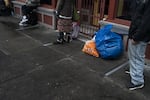
Street Roots vendors maintain social distancing while waiting to receive their paychecks on March 25, 2020 in Portland, Oregon. Street Roots is a newspaper in Portland that covers social justice issues and provides income opportunities for the unhoused community.
Jonathan Levinson / OPB
Rainbow said she has severe borderline personality disorder and hyperthyroidism. She used to be a flagger on construction sites and did ramp control at airports helping guide airplanes at the gate, but she said working for a boss has never been a strong point.
Her experience as a flagger has a particularly important application now. At Street Roots, she does security and helps manage the long lines that can form.
“So now I'm flagging people,” she said. “And I'm actually extremely happy every day. I'm dancing over there in the morning, waiting for the door to open.”
She said she’s also learning more about herself.
“I'm learning how I can be here every single day and I can be reliable. So I've never had that before,” Rainbow said.
A few blocks away, Mike Dusek was handing out the last couple bags of goods to people sheltered underneath the Burnside Bridge.
“It’s kind of the safety in masses,” he said. “People just trying to make sure that everybody is getting through.”
Dusek said he thinks this is just the beginning of a lot of changes for Portland’s unhoused community. He just hopes they last once the pandemic is over.
